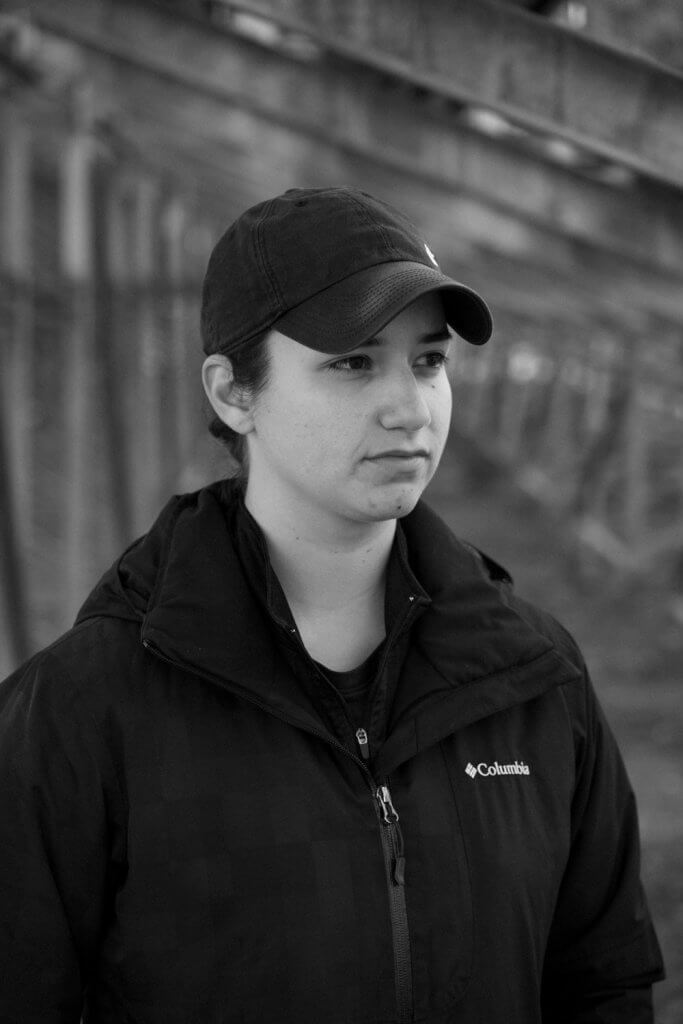
Changing the Face of Football
Sophia Lewin doesn’t look like your average football coach. That’s because she’s not.
The love of a sports team can be inherited; what we do with it is up to us.
Growing up, Sophia Lewin absorbed her father’s tales of the 1970s Oakland Raiders, tough-as-nails competitors who were nonconformists in every sense of the word. Surely those stories played a part in molding Lewin, a self-described underdog who, in true trailblazer fashion, refuses to adhere to convention.
The 2019 Monmouth grad just finished her first year as receivers coach at Hudson Catholic High School in Jersey City, New Jersey. In February, she was hired as an offensive quality control coach for Princeton University’s football team. Uncomfortable with her presence on the sideline? Too bad. “I believe in me,” says Lewin.
Like any first job, Hudson Catholic presented challenges. Yes, there was a 4–7 season, but Lewin also had to understand the unseen details of a football game, such as substitutions and managing playing time. There was also an unanticipated emotional component: The players came to her with personal problems. That’s where her sociology degree became an asset.
Overall, it was a promising start for the 22-year-old, who admits she has a long way to go.
“Once you feel like you’ve made it, I think that’s when you’re declining,” says Lewin. “I just want to continue to be a student of the game. I want to continue to learn.”

Lewin’s curiosity raged even before she arrived at Monmouth in 2015. While attending Wayne Hills High School, she applied to be the team manager. The head coach, Wayne Demiko , asked Lewin if she had any questions. Yes, she said. What’s the difference between a gap scheme and a zone scheme in run blocking? “He got me right away,” says Lewin. The two hit it off, and Demiko let Lewin shadow the coaching staff for two seasons.
Monmouth is where Lewin, a student assistant on the Hawks football team for three seasons, became fluent in football, connecting the myriad strategies with what she saw on the field. Her biggest ally was then-wide receivers coach (and current pass game coordinator/quarterbacks coach) TJ DiMuzio, a mentor who improved Lewin’s football IQ and instilled confidence. He brought her into receivers meetings. They watched game film. Eventually, DiMuzio allowed his mentee to coach his players individually in practices.
Lewin also found two steadying influences—and future friends— in the classroom at Monmouth. Professors Johanna E. Foster and Jennifer McGovern exposed Lewin to new ideas about gender, sex, and race, which were invaluable last season as she got her players—high school boys with sometimes troubled backgrounds—to open up. “I think it’s important that you’re vulnerable and that you let people in. You can’t be afraid to say, ‘Hey, I’m having a really bad day,’ or, ‘I’m not OK,’ or, ‘This happened in my house,’” says Lewin. “You have to tell me. I’m not going to read your mind and know. I’ve got to know you’re not OK. Otherwise I’m not doing my job, and you’re certainly not going to do yours.”
This is not the approach of Belichick, Parcells, and fabled old-school coaches. Yes, Sophia Lewin wants to win. And she wants to coach in the NFL. But there’s no rush. Her goals lie “beyond the title,” she says. “It’s to try to help people be really good human beings.”
That includes herself.
“When I’m in a position to help young people do the things they want to do,” she says, “I’m never going to tell them that they cannot do something because of something irrelevant to the job.”